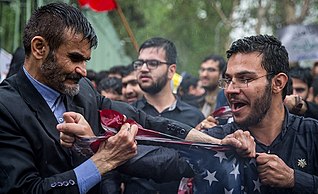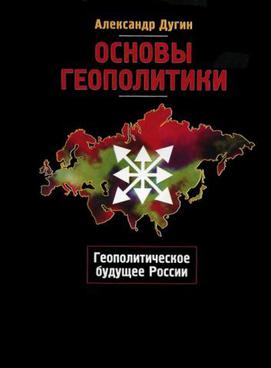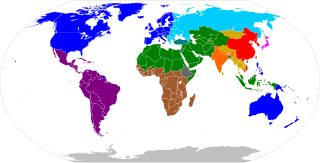Progressive may refer to:

The Bush Doctrine refers to multiple interrelated foreign policy principles of the 43rd President of the United States, George W. Bush. These principles include unilateralism, preemptive war, and regime change.
Independent or Independents may refer to:

Anti-Americanism is a term that can describe several sentiments and positions including opposition to, fear of, distrust of, prejudice against or hatred toward the United States, its government, its foreign policy, or Americans in general.

American exceptionalism is the belief that the United States is either distinctive, unique, or exemplary compared to other nations. Proponents argue that the values, political system, and historical development of the U.S. are unique in human history, often with the implication that it is both destined and entitled to play a distinct and positive role on the world stage.

In the United States, the term hyphenated American refers to the use of a hyphen between the name of an ethnicity and the word American in compound nouns, e.g., as in Irish-American. Calling a person a "hyphenated American" was used as an insult alleging divided political or national loyalties, especially in times of war. It was used from 1890 to 1920 to disparage Americans who were of foreign birth or ancestry and who displayed an affection for their ancestral language and culture. It was most commonly used during World War I against Americans from White ethnic backgrounds who favored United States neutrality during the ongoing conflict or who opposed the idea of an American alliance with the British Empire and the creation of what is now called the Special Relationship, even for purely political reasons.

Americentrism, also known as American-centrism or US-centrism, is a tendency to assume the culture of the United States is more important than those of other countries or to judge foreign cultures based on American cultural standards. It refers to the practice of viewing the world from an overly US-focused perspective, with an implied belief, either consciously or subconsciously, in the preeminence of American culture.
Americanism was, in the years around 1900, a political and religious outlook attributed to some American Catholics and denounced as heresy by the Holy See.
Pan-nationalism is a specific term, used mainly in social sciences as a designation for those forms of nationalism that aim to transcend traditional boundaries of basic or historical national identities in order to create a "higher" pan-national (all-inclusive) identity, based on various common denominators. Pan-nationalism can occur as a specific variant of all common forms of nationalism. In relation to classical state nationalism, pan-nationalism manifests itself through various political movements that advocate the formation of "higher" (pan-national) forms of political identity, based on a regional or continental grouping of national states. In terms of ethnic nationalism, pan-nationalism can also manifest itself through specific ethnic movements that advocate setting up "higher" (pan-national) forms of common identity that are based on ethnic grouping. Other forms of nationalism also have their pan-national variants.
Pan-American, Pan American, Panamerican, Pan-America, Pan America or Panamerica may refer to:
Mary or Marie Taylor may refer to:
An Americanist studies the Americas, American culture, or American language. It may refer to:

The Foundations of Geopolitics: The Geopolitical Future of Russia is a geopolitical book by Aleksandr Dugin. Its publication in 1997 was well received in Russia; it has had significant influence within the Russian military, police, and foreign policy elites, and has been used as a textbook in the Academy of the General Staff of the Russian military. Powerful Russian political figures subsequently took an interest in Dugin, a Russian political analyst who espouses an ultranationalist and neo-fascist ideology based on his idea of neo-Eurasianism, who has developed a close relationship with Russia's Academy of the General Staff.

Anti-Western sentiment, also known as anti-Atlanticism or Westernophobia, refers to broad opposition, bias, or hostility towards the people, culture, or policies of the Western world.

Americanism, also referred to as American patriotism, is a set of nationalist values which aim to create a collective American identity for the United States that can be defined as "an articulation of the nation's rightful place in the world, a set of traditions, a political language, and a cultural style imbued with political meaning". According to the American Legion, a U.S. veterans' organization, Americanism is an ideology, or a belief in devotion, loyalty, or allegiance to the United States of America, or respect for its flag, its traditions, its customs, its culture, its symbols, its institutions, or its form of government. In the words of Theodore Roosevelt, "Americanism is a question of spirit, conviction, and purpose, not of creed or birthplace."

Anti-American sentiment in Iran is not new; the chant "Death to America" has been in use in Iran since at least the Islamic revolution in 1979, along with other phrases often represented as anti-American. A 1953 coup which involved the CIA was cited as a grievance. State-sponsored murals characterised as anti-American dot the streets of Tehran. It has been suggested that under Ayatollah Khomeini anti-Americanism was little more than a way to distinguish between domestic supporters and detractors, and even the phrase "Great Satan" which has previously been associated with anti-Americanism, appears to now signify either the United States or the United Kingdom.
The American Creed is a term used to refer to the idea that the defining element of American identity, first formulated by Thomas Jefferson and elaborated by many others, includes liberty, equality, justice, and humanity. Not to be confused with Dean Alfange's "An American's Creed".
Fascism is a political ideology, advocating an authoritarian, hierarchical government.
Unamerican or Un-American may refer to:







